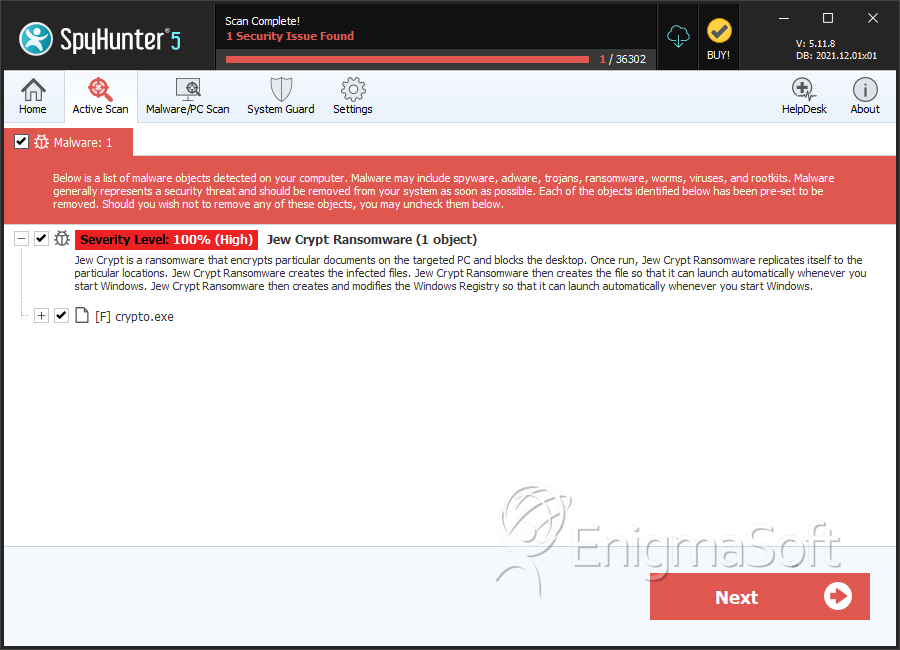Jew Crypt Ransomware
Threat Scorecard
EnigmaSoft Threat Scorecard
EnigmaSoft Threat Scorecards are assessment reports for different malware threats which have been collected and analyzed by our research team. EnigmaSoft Threat Scorecards evaluate and rank threats using several metrics including real-world and potential risk factors, trends, frequency, prevalence, and persistence. EnigmaSoft Threat Scorecards are updated regularly based on our research data and metrics and are useful for a wide range of computer users, from end users seeking solutions to remove malware from their systems to security experts analyzing threats.
EnigmaSoft Threat Scorecards display a variety of useful information, including:
Ranking: The ranking of a particular threat in EnigmaSoft’s Threat Database.
Severity Level: The determined severity level of an object, represented numerically, based on our risk modeling process and research, as explained in our Threat Assessment Criteria.
Infected Computers: The number of confirmed and suspected cases of a particular threat detected on infected computers as reported by SpyHunter.
See also Threat Assessment Criteria.
| Threat Level: | 100 % (High) |
| Infected Computers: | 4 |
| First Seen: | January 23, 2017 |
| Last Seen: | August 17, 2022 |
| OS(es) Affected: | Windows |
The 'Jew Crypt' Ransomware is a ransomware Trojan that was first observed on January 23, 2017. The 'Jew Crypt' Ransomware receives its name from a ransom notification window that it displays. Clearly, the 'Jew Crypt' Ransomware was not created by a sophisticated group of threat creators. The 'Jew Crypt' Ransomware uses a faulty encryption engine and the email address ransom@mail2tor.com is used to contact the 'Jew Crypt' Ransomware's creators. The 'Jew Crypt' Ransomware is so limited currently that it is possible that it simply will not work in most cases. It seems that the 'Jew Crypt' Ransomware may be an unsuccessful attempt to combine the code of several other ransomware Trojans.
The 'Jew Crypt' Ransomware Distribution Methods
Despite the 'Jew Crypt' Ransomware not working correctly in most cases currently, it is still being distributed using typical spam email methods. In many cases, these spam emails will trick computer users into opening a text or a PDF attachment, which uses corrupted macros to download and install the 'Jew Crypt' Ransomware on the victim's computer. The 'Jew Crypt' Ransomware attack itself is meant to be similar to most other ransomware Trojans. Typically, the macro-enabled file will download and install the 'Jew Crypt' Ransomware on the victim's computer. Once the 'Jew Crypt' Ransomware has been installed, it will carry out its attack. Typically, the 'Jew Crypt' Ransomware's files will be installed in the Temp directory, and then this threat will establish a connection with its Command and Control server. The 'Jew Crypt' Ransomware will send basic information about the infected computer to its Command and Control server, such as the infected computer's name, Windows version, approximate location and IP information.
Once this has been carried out, the 'Jew Crypt' Ransomware will begin its encryption routine. However, versions of the 'Jew Crypt' Ransomware observed by PC security researchers have been incapable of carrying out an effective encryption routine, corrupting the victim's data instead. Once the 'Jew Crypt' Ransomware's 'encryption' is complete, the 'Jew Crypt' Ransomware will display a ransom note that demands the payment of a ransom from the victim. The following is the full message displayed by the 'Jew Crypt' Ransomware in its notification window:
'YOUR FILES HAVE BEEN ENCRYPT
I have encrypted your files and you wont be able to get them back unless you pay the 0.01 bitcoin ransomfee! If you do not pay within a week then your files will be deleted and you wont be able to get them back! As soon as you pay you should send an email to ransom@mail2tor.com with your transaction key and I will give you the decryption key within 2 workdays!'
Dealing with the 'Jew Crypt' Ransomware Infection
Fortunately, the key needed to unlock the 'Jew Crypt' Ransomware is contained in the 'Jew Crypt' Ransomware's code, which has allowed PC security researchers to find it easily. In its current state, the 'Jew Crypt' Ransomware is a little more than a lock screen attack, since its encryption functionality is unimplemented currently (however, it is not unlikely that con artists may improve the 'Jew Crypt' Ransomware in the future to ensure that it can encrypt the victim's files as stated in its notification window). To unlock an affected computer, the 'Jew Crypt' Ransomware uses the tacky unlock key 'JewsDid911,' which would be typed into the ransom notification pop-up window without the quotation marks.
Although it is possible that the 'Jew Crypt' Ransomware will be upgraded, it is likelier that the authors of the 'Jew Crypt' Ransomware will abandon it altogether. However, for many computer users, the 'Jew Crypt' Ransomware can be a real problem. A reliable security program that is fully up-to-date can protect your computer. Be cautious when handling unsolicited email attachments to avoid the 'Jew Crypt' Ransomware and similar types of infections.
SpyHunter Detects & Remove Jew Crypt Ransomware

File System Details
| # | File Name | MD5 |
Detections
Detections: The number of confirmed and suspected cases of a particular threat detected on
infected computers as reported by SpyHunter.
|
|---|---|---|---|
| 1. | crypto.exe | 44941489b16a37d5b2909d201d52cdf4 | 1 |


Submit Comment
Please DO NOT use this comment system for support or billing questions. For SpyHunter technical support requests, please contact our technical support team directly by opening a customer support ticket via your SpyHunter. For billing issues, please refer to our "Billing Questions or Problems?" page. For general inquiries (complaints, legal, press, marketing, copyright), visit our "Inquiries and Feedback" page.